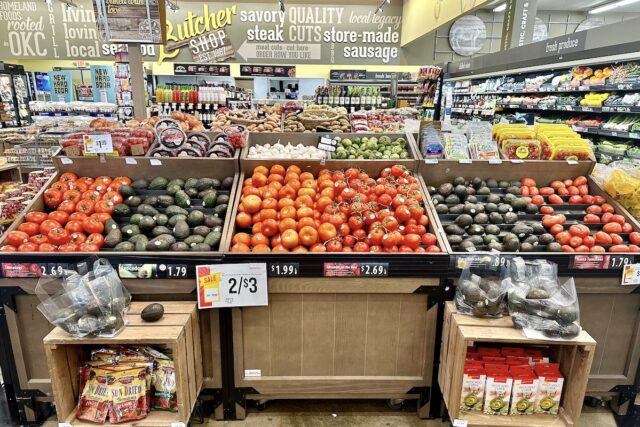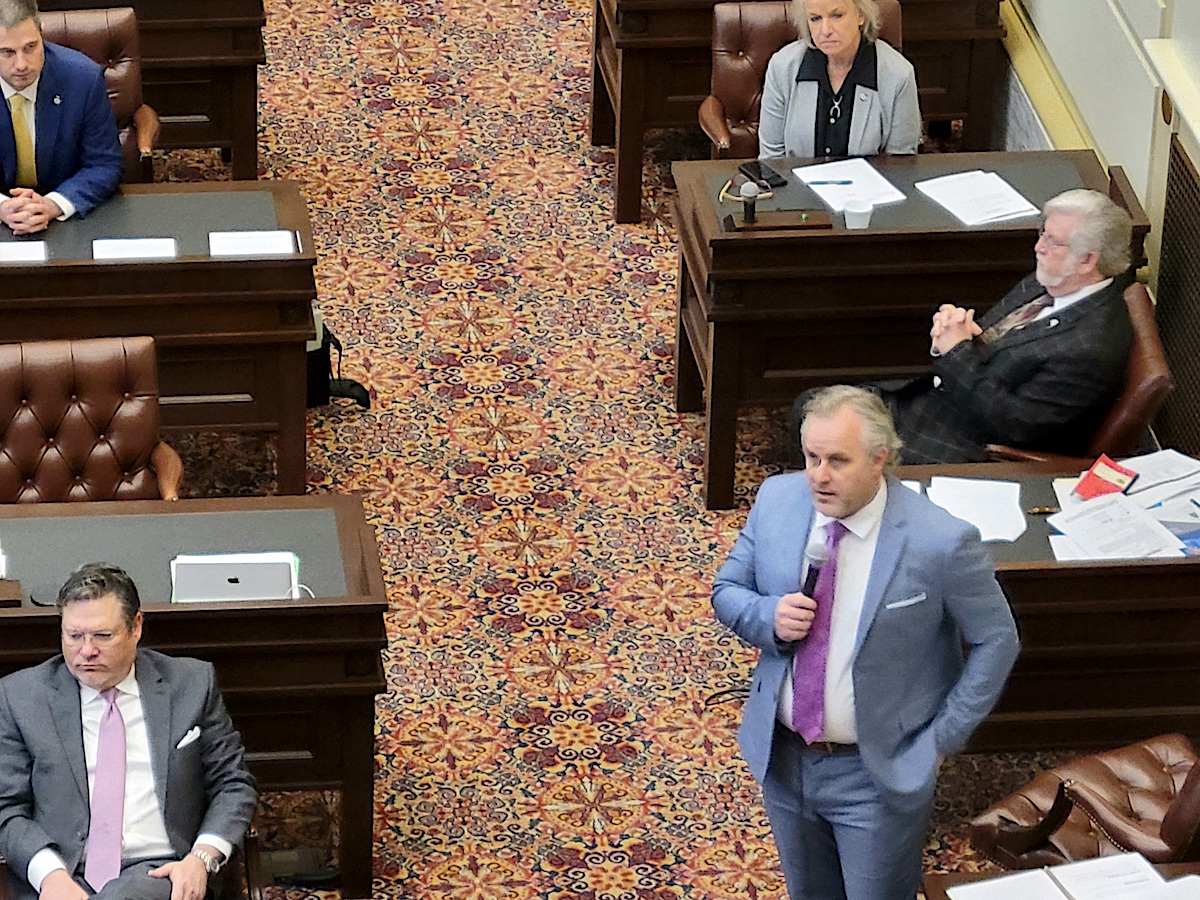

Oklahoma Gov. Kevin Stitt will get a tax cut he has pledged to sign, but not the one he most craved.
The State Senate today voted 42-2 to send him House Bill 1955, which would reduce to zero the state’s 4.5 percent portion of sales tax on groceries, defined in the bill as “food and food ingredients.” Locally assessed sales taxes on groceries will remain, but until June 30, 2025, any city or county sales tax election must specify that it would not apply to food items.
The measure, which passed 88-7 last year in the House of Representatives and was still eligible for consideration in the Senate this year, is on its way to Stitt for final approval. He is expected to sign it, even though Senate leaders say HB 1955’s passage means they will not approve the governor’s first choice on tax cuts: reducing the state’s personal income tax rate by 0.25 percent.
“I would still 100 percent sign it,” Stitt said Feb. 9. “From the very beginning, I’ve said, listen, that is the most regressive tax that we have.”
Thursday afternoon, Stitt released a statement celebrating HB 1955’s passage.
“Today, we get to fulfill a promise to all four million Oklahomans and pass the largest single year tax cut in Oklahoma history. Cutting the grocery tax means relief for all Oklahomans,” Stitt said. “I’ve called for tax cuts since 2019, and in 2022 I called a special session specifically to cut the grocery tax. I want to thank Speaker (Charles) McCall and the House for tirelessly fighting for tax cuts, and to (Senate) Pro Tem (Greg) Treat and the Senate for sending this to my desk.”
Although he pushed the grocery tax cut in years earlier, Stitt sought an income tax reduction last year and again last month when he called a special session one week before the Feb. 5 start of regular session. A 0.25 percent cut in the personal income tax has been estimated to drop future collections by about $250 million for a full fiscal year.
However, during his State of the State address to lawmakers to open session, Stitt said he would “sign any tax cut that comes to my desk.”
HB 1955 would take effect in August.
“Once signed into law and after it takes effect, this will give Oklahomans relief every time they purchase groceries,” Senate President Pro Tempore Greg Treat (R-OKC) said before Thursday’s vote. “This legislation is common sense and will help everyone.”
The two senators who voted against the measure, Senate Appropriations and Budget Chairman Roger Thompson (R-Okemah) and Sen. Mary Boren (D-Norman) said they are concerned about the measure’s roughly $418 million annualized price tag, which will leave lawmakers this year with approving mostly a flat budget at a time when the state has a number of infrastructure and other needs. They also expressed concern that local governments might increase their sales taxes now that the state’s portion is gone.
Thompson said the more than $400 million annualized impact that will eat up almost all of what he considers to be additional recurring revenue that legislators have to appropriate or cut taxes with for the Fiscal Year 2025 budget, which takes effect July 1.
The State Board of Equalization last week certified the amount lawmakers have available to appropriate at about $13.9 billion. Legislators are authorized to spend up to 95 percent of that amount, although they have stopped short of that percentage in recent years, and House Appropriations and Budget Chairman Kevin Wallace (R-Wellston) said that will likely be the case again for FY 2025.
While saying that eliminating the state’s portion of the grocery tax is “excellent policy,” Thompson said he is concerned about taking such a large sum out of recurring revenue. Inflation is also hitting state agencies and the state is faced with increasing operating costs, he said.
“I believe the day will come when this vote will be remembered as the beginning of the descent of our fiscal soundness,” Thompson said. “We finally got to be where we need to be. We got $6.5 million returned this year because our credit rating went up, and we’re paying our bills.”
He recalled that Oklahoma had only $2.03 in its Rainy Day Fund savings account in 2011. Part of the reason the savings account was so depleted stemmed from prior cuts to Oklahoma’s personal income tax rate after a couple years of high natural gas prices. Gas prices then went down, and the country went through a national recession, causing Oklahoma to cut agency budgets.
Oklahoma’s economy recovered in 2012, but another downturn occurred in 2015 through 2018, causing the state to have deficits ranging from $680 million to $1.3 billion.
“Those were difficult days,” Thompson said.
Raising taxes to generate more revenue is a Herculean task in Oklahoma, Thompson said. Passed in 1992, State Question 640 that voters passed in 1992 that requires any revenue-raising measure to receive 75 percent support in both the House and the Senate, or receive approval from voters statewide.
Lawmakers accomplished a revenue-raising feat in 2018 to generate funds used to backfill the budget deficit and provide a historic teacher pay and school funding increase, but the brutal political fight featured multiple special sessions and culminated with a teacher walkout days after the tax increases passed the Legislature.
Treat: ‘There is no way to do more (tax cuts) at this time’

Treat told senators he preferred to think of HB 1955’s $418 million cost as an investment in giving Oklahomans some relief from higher grocery prices caused by inflation. He said it’s estimated that each Oklahoman will save about $104.25 each year.
The sales tax reduction will apply to all groceries, but not items that are already prepared for immediate consumption, such as baked goods and pizza, Treat said. State sales tax will also still apply to alcoholic beverages, dietary supplements, tobacco and marijuana products.
Treat said Oklahoma is on much more solid economic ground now than in many years past.
Oklahoma’s Constitutional Reserve or “Rainy Day” Fund has $1.27 billion in it, and the state has another $4.1 billion in other reserves and about $2 billion in cash.
Speaking to media after Thursday’s vote, Treat said he would consider drawing about $1 billion from one-time available cash to pay for infrastructure projects this session.
“We have the ability to make some critical investments (…) with one-time monies,” he said.
Thompson concurred, but he said he wouldn’t want to see any more than that taken from the cash accounts.
“In 2020, we had to use $400 million to offset a revenue shortfall, and I would be very uncomfortable to get below $1 billion in cash,” he said.
Still, Treat said the grocery tax bill would be the only tax relief the Senate will seek this year.
“To ensure state services and recent critical investments in education and infrastructure remain intact in the long and short term, there is no way to do more at this time,” Treat said.
House Speaker Charles McCall (R-Atoka), however, released a statement saying he remained optimistic that the Senate would consider reducing the personal income tax rate.
“There is continued work to be done to give Oklahomans back more of their hard-earned money,” McCall said. “While the grocery tax is a good first step, it is not the only action needed to accomplish that goal. The House always knew this legislation would pass if put up for a vote, and we feel the same way about the 0.25 percent income tax cut. The House would still like to see a vote taken on the income tax cut legislation that was passed to the Senate in special session and will continue to explore every opportunity to lower the tax burden for all Oklahomans.”
House Democratic Minority Leader Cyndi Munson (D-OKC) applauded the Senate for passing HB 1955, which she said “will help so many Oklahoma families.”
“For the past several legislative sessions, including special sessions, the House Democratic Caucus has filed legislation to eliminate the state sales tax on groceries to provide immediate tax relief for working Oklahomans each time they go to the grocery store,” she said in a statement.
McCall said Oklahomans would have saved more money if the Senate had acted on HB 1955 last year and if the measure that passed Thursday included its original emergency clause, which would have caused it to take effect immediately.
But Treat said having the bill take effect immediately would have been stressful for vendors and store owners who need time to adjust their systems to accommodate the change in the sales tax rate. It also gives the Oklahoma Tax Commission time to promulgate rules to accommodate the elimination of the state sales tax on groceries, he said.
Nonetheless, McCall called it “a truly historic day.”
“With the passage of House Bill 1955, the Legislature has managed to give Oklahomans the largest single year tax cut in state history (…) at a time when they need it the most,” McCall said.
(Update: This article was updated at 2:45 p.m. Thursday, Feb. 22, to include additional comments from Stitt, Treat and Thompson. It was updated again at 1 a.m. Friday, Feb. 23, to correct an error and reflect that HB 1955 considers soft drinks as food.)




















